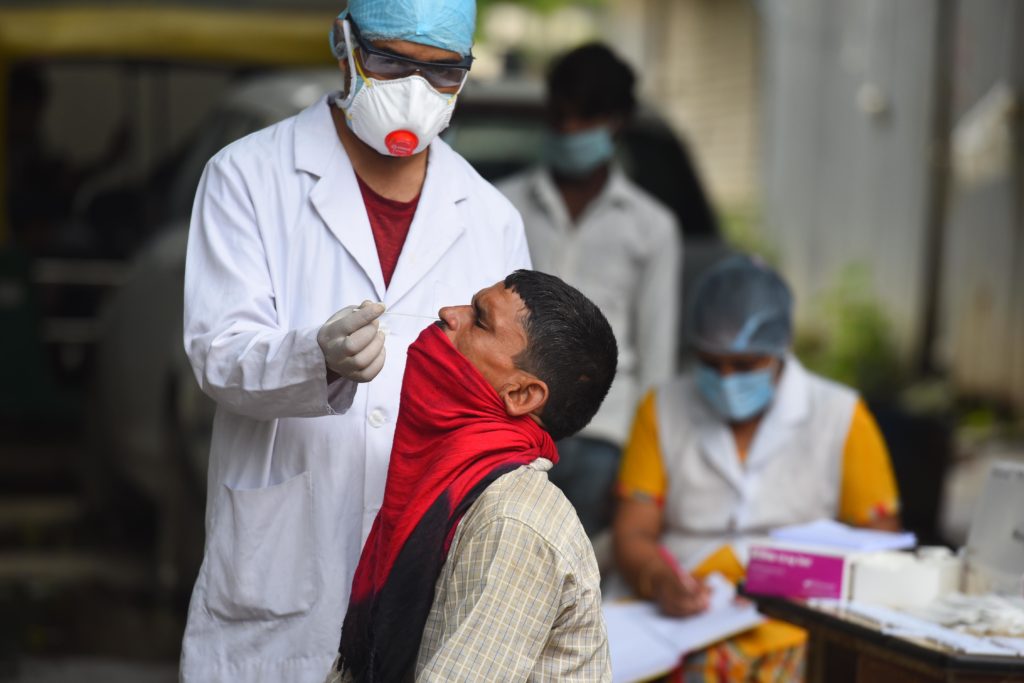India confirmed over 80,000 new coronavirus cases and more than 1,000 deaths in the past 24 hours, giving it the second highest number of total confirmed infections worldwide after the United States. There have been over six million confirmed Covid-19 cases, however a lead pandemic agency says that based on the results of antibody surveys, there could actually be up to 60 million cases. The number of new daily infections in India has been around 80,000 for the past few days and the death toll is rapidly approaching 100,000.
Part of the reason that the true caseload could be so much higher than the confirmed caseload is the lack of testing. Only about 82 of every 100,000 people in India are being tested per day compared to about 284 in the U.S. and 329 in the UK. Test positivity rates are still high, at around seven percent as of September 30.
States such as Chhattisgarh where nearly half of the residents live under the poverty line are experiencing some of the sharpest caseload increases. Additionally, Chhattisgarh does not have the appropriate health infrastructure to handle the 86,000 cases. Weeklong lockdowns are being initiated in 12 of Chhattisgarh’s 29 districts, including in the state capital, but this is too little too late.
Prime Minister Narendra Modi has continued to prioritize capital over the lives of Indian workers, as he has granted states more latitude to reopen shops, offices and public transport. The Bharatiya Janata Party (BJP) government’s health minister, Harsh Vardhan, is trying to downplay the pandemic’s impact, claiming that 92 percent of cases reported are “mild,” and extolling India’s response to the pandemic as among the best in the world to justify reopening measures. India’s Unlock 4 plan permits students to take exams outside of their homes, reopens nonessential entertainment activities such as restaurants and hotels, and allows unrestricted travel across the states. As part of Unlock 5 starting on October 15, the BJP-led government also issued guidelines allowing movie theatres to reopen at 50 percent capacity and is allowing states to decide when to gradually open schools, colleges, and other educational institutions. All government regulations claim to be subject to the use of masks, social distancing, etc., while the government is not providing any actual reinforcement of those guidelines, washing its hands of any responsibility for the rising death toll. On one hand the Indian government is encouraging high-risk businesses to reopen for the sake of the economy, and on the other, it is punishing ordinary Indians for minor infractions. The Pune Police have fined as many as 27,989 people within a span of eight days for not wearing face masks and collected over 10,000,000 rupees in fines.
Modi’s Attacks on the Working Class
Modi and the BJP have continued to live up to their reputation as the “Indian capitalists’ most favored party.” Before the pandemic, Modi had already passed a budget with pro-big business measures, including a massive corporate tax cut and increased privatization. In February 2020, the healthcare budget was a paltry 675 billion Rupees ($9.5 billion), which translates to $7.30 (Rs. 519) per person over the course of the entire year. May’s $270 billion stimulus package prioritized tax breaks for small businesses as well as incentives for domestic manufacturing instead of providing direct relief to the most vulnerable. Despite widespread financial distress among the general population, state governments are still proposing austerity budgets that could last until the end of March 2021.
The Indian working class has already been hit extremely hard by the pandemic. A survey by Flourish Ventures found that nearly 90 percent of Indian gig workers lost income during the pandemic, and more than a third surveyed were making less than 5,000 Rupees (approximately 68 U.S. Dollars ) per month by August. This survey also found that 47 percent of gig workers could not cover their expenses for a month without borrowing money. These responses demonstrate the extent of the precarity for large sectors of workers, and new labor laws threaten them further. The Code on Social Security consolidates existing social security legislation but excludes informal and migrant workers and defines categories of workers covered by the codes in terms that do not characterize their usual working conditions, making them ineligible for benefits. The Occupational Safety, Health and Working Conditions Code does not specify the minimum standards for occupational safety and health or even for daily and weekly working hours, and creates a standard of 250 employees before developing a safety committee though most unorganized workers are self-employed or work in small groups. A social security fund is being created for unorganized sectors and migrant workers, however it will not provide them any sort of special protection from the government in the event of an accident, closure of business, or emergencies related to the pandemic. Most damningly, the definition of worker was restricted to leave many sectors such as gig/platform workers, IT workers, self-employed workers, home-based workers, unorganized and informal sector workers, plantation workers, etc. out of statutory industrial relations protection. The most vulnerable sectors of workers, who have already suffered great devastation during the pandemic are going to be further exploited by capitalists during the process of reopening, and will have virtually no protections or recourse.
Using Kerala’s Coronavirus Response as a Model
In contrast to Modi’s uncoordinated and insufficient approach, Kerala’s coronavirus response provided a glimpse of the effectiveness of a socialist coronavirus response. Kerala’s Communist Party of India (Marxist) (CPI(M))-led Left Democratic Front invested into public healthcare systems between 2006-2011, developing a robust public health infrastructure with every village having a primary health centre, hospitals at each level of its administration, as well as 10 medical colleges. Additionally Shailaja, the health minister and member of the CPI(M) created clinics and a registry for respiratory disease, so they were able to identify community transmission of coronavirus much earlier on. Kerala mobilized rapidly to limit transmission by conducting extensive contact tracing and performed one of the highest numbers of coronavirus tests. At the height of the virus in the state, 170,000 people were quarantined and placed under strict surveillance by visiting health workers, and those without indoor bathroom facilities were housed in improvised isolation units using state government money. The government also took control of hotels and vacant buildings and converted them into quarantine facilities. The Centre of Indian Trade Unions, the largest trade union in Kerala, mobilized its members to disinfect public spaces, and the Democratic Youth Federation of India along with the Kudumbashree women’s cooperatives led a public drive to produce hand sanitisers and masks. Social services such as free grocery delivery, community kitchens to provide cooked food to the most marginalized such as the unhoused and migrant workers, psychological and social support, and a WhatsApp helpline for women to report domestic violence incidents have also been critical to their success. The state government also provided some economic cushioning by hiring more workers under rural employment guarantee schemes, providing loans to families, giving older people early access to their pensions, and suspending utility payments for two months. The investment in public health systems, government-funded public health initiatives, worker-led and organized support, social services, and economic relief all demonstrate the possibilities and efficiency of a communist party prioritizing the public’s health and well-being over rushing the reopening of the economy. Unfortunately, Kerala is starting to see a second spike in cases with more than 72,000 active Covid-19 cases, the third highest among Indian states. With cases starting to rise again, the Kerala government has imposed Section 144 which prohibits the gathering of more than five people from October 3 to October 21 to contain the spread of the virus.
Too many have died at the hands of the mismanagement of the coronavirus response by Modi and the BJP. Workers are going to continue to be sacrificed at the altar of capitalism under the guise of “restoring the economy.” Growing numbers of workers have participated in strikes and other protests in recent weeks, speaking out against planned privatizations and authorities’ failure to supply adequate personal protective equipment for health care and other frontline workers during the pandemic. Mass action by the working class, especially its most vulnerable sectors, is essential to halt reopening, slow the spread of the virus, and save millions of lives that are now at risk. With the concurrent pandemics of coronavirus and capitalist crisis attacking the working class and oppressed, there is only one cure that can truly save lives: socialism.











